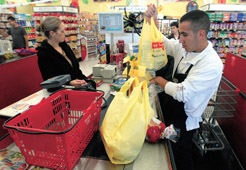
City, county researching ways to discourage the use of plastic
bags at local stores
While not considering an outright ban on the use of plastic bags
in local stores, city and county officials are researching how
other jurisdictions are working to reduce the use of the bags while
encouraging more environmentally-friendly options.
City, county researching ways to discourage the use of plastic bags at local stores
While not considering an outright ban on the use of plastic bags in local stores, city and county officials are researching how other jurisdictions are working to reduce the use of the bags while encouraging more environmentally-friendly options.
“We’re not looking at a punitive-type thing,” said Hollister City Councilman Doug Emerson, who briefly addressed the issue at a recent council meeting. “As far as I’m concerned, I want to discourage the use of plastic bags,” not ban their use altogether. “You’ve got the little stores that are selling small goods [and using plastic bags]. I’d hate to be punitive to them.”
City Manager Clint Quilter said he is in the process of “gathering information from other jurisdictions,” though he doesn’t expect to have a report ready for the council before December. “The thought is, ‘Everybody else is doing it, so what can we do?'”
Jim Gibson, an owner of Hollister Super and Baler Market in Hollister and Windmill Market in San Juan Bautista, said plastic bags are used by retailers and grocers because they are relatively inexpensive. He recalls getting into the business 30 years ago when only paper bags were used.
“There are two sides to the issue, since paper does break down and plastic bags blow around in the breeze” when they are discarded, he said. He noted, however, that the production of paper bags carries its own environmental concerns. “We get a lot of customers, not a huge percentage – up to 5 percent – who bring canvas bags for their groceries when they shop. I don’t want to retard the effort [to find environmentally-conscious options for bagging groceries] as long as the playing field is even.”
At Gibson’s stores, he said, clerks don’t ask “paper or plastic?” when bagging groceries. Instead, they use plastic bags unless a customer specifically asks for paper.
“It’s much quicker and more convenient,” he said, adding that paper bags in all sizes are available “and we have participated in canvas bag giveaways in all of our stores.”
Mandy Rose, the county’s Integrated Waste Management director, said a growing number of cities and counties in California “are looking at or have implemented bans” on the use of plastic bags in stores.
Locally, however, she termed discussions about such limits “very generic.”
“Our position has been there are lots of things going on internationally, nationally and statewide. We just want to encourage more reusable options,” she said.
Rose said her department plans to work with local businesses to help them transition to other kinds of bags that are reusable or can be composted.
“We are encouraging reusable bags, not saying we should do an outright ban,” she said. “You really want to try to push incentives before moving toward anything with reference to an outright ban. Knowing that a ban might be coming from the state anyway, we could help people with that transition. We’re supporting behavior changes. It’s an elected officials’ job, not mine” to decide how or whether to enforce particular rules on the use of bags at retail and/or grocery stores.
The city of San Francisco, which already bans large grocery stores and pharmacies from bagging customers’ items in plastic, is now debating the merits of legislation that would require those stores to offer a 10-cent rebate as an incentive to bring their own bags, according to the San Francisco Chronicle.
The ordinance, if approved, would include fines of up to $500 for stores that don’t offer the rebate.
San Jose recently approved a ban that bars retailers from providing single-use plastic bags to customers. Paper bags made with at least 40 percent recycled materials will be allowed, but at a fee. The planned ban is undergoing an environmental study and won’t go into effect for two years.
Officials say such strict rules are not under consideration locally. Some Hollister grocery stores already offer per-bag discounts for customers who bring in their own reusable bags instead of using the paper or plastic options provided by the store.
Brenda Weatherly, executive director of the Hollister Downtown Association, said the HDA “would have to broach the subject [of a bag ban] if it becomes an issue,” likely by talking with other “main-street communities to find out how they’ve handled the situation.”
“Unfortunately, plastic bags are the least expensive way to package people’s purchases,” she said. “It’s really a way for businesses to keep their costs down. It’s too bad we don’t always recycle them.”
Other than the cost savings provided by plastic bags, they also offer a marketing opportunity, Weatherly said, because stores can put their names and contact information on the bags.








